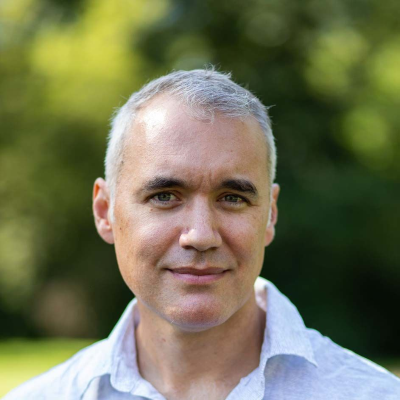Can solar farms develop quickly and equitably? MSU faculty awarded $2.5 million to explore conflict in solar energy development
Department of Community Sustainability associate professor, Dr. Doug Bessette, awarded $2.5 million to lead project team exploring conflict in solar energy development and how to promote collaboration in solar projects.

 Dr. Doug Bessette, Associate Professor in the Department of Community Sustainability at Michigan State University, and partners were selected to receive a $2,500,000 award from the U.S. Department of Energy Solar Energy Technologies Office (SETO) for social science research to improve large-scale solar siting processes and outcomes for host communities—particularly those that are disadvantaged— as well as the solar industry and other stakeholders. This project aims to answer a single comprehensive research question: how can we speed large-scale solar permitting processes, while also reducing community burdens, improving community outcomes, and improving residents’ perceptions of solar? Put simply, how can solar development be both fast and fair?
Dr. Doug Bessette, Associate Professor in the Department of Community Sustainability at Michigan State University, and partners were selected to receive a $2,500,000 award from the U.S. Department of Energy Solar Energy Technologies Office (SETO) for social science research to improve large-scale solar siting processes and outcomes for host communities—particularly those that are disadvantaged— as well as the solar industry and other stakeholders. This project aims to answer a single comprehensive research question: how can we speed large-scale solar permitting processes, while also reducing community burdens, improving community outcomes, and improving residents’ perceptions of solar? Put simply, how can solar development be both fast and fair?
Through a close study of 10 different solar projects across the US, the research team will examine how more active engagement between developers, local officials, stakeholders and residents affects project timelines and outcomes. The team seeks to quantify how different policy environments (i.e., solar permitted at either the local or state level) affect decision-making, trust between stakeholders, project designs and costs, and community benefits. The goal is to provide comparative use-cases for future communities to be able to assess and compare solar projects or proposals.
Bessette, the project’s principal investigator, says “more and more states are moving from local township and county boards permitting solar projects to state-appointed permitting boards. It’s thought that this process will speed development, but citizens have voiced concerns about being excluded from or marginalized by the process. Our hope is to determine how best to create an even-playing field while also ensuring residents have a meaningful say in how solar is developed in their community.”
The research team will explore community attitudes of the 10 solar projects through longitudinal surveys, which are surveys sent to community members multiple times over the course of a project. This strategy allows the research team to assess how residents feel about specific project decisions, timelines, means of engagement, and proposed community benefit packages and understand preferences for future decisions or designs. Bessette notes the team also intends to conduct interviews, focus groups and an analysis of ordinances, permits, and media accounts to better understand community-members and solar projects.
"We're excited to link our years of experience working directly in hundreds of communities on solar facilities to this project. The dedication of this diverse team of researchers, organizations and energy experts to finding the path to positive outcomes for both communities and our energy needs is invaluable and inspiring," said Ed Rivet, project team member and director of Michigan's Land & Liberty Coalition.
Michigan State University was selected as a part of the SETO Solar Energy Evolution and Diffusion Studies 4 (SEEDS 4) program as one of several projects that will study community acceptance and opposition to large-scale solar projects, permitting and land use planning for large-scale solar deployment, and best practices for engaging with communities during the siting process.
About the Solar Energy Technologies Office
The U.S. Department of Energy Solar Energy Technologies Office accelerates the advancement and deployment of solar technology in support of an equitable transition to a decarbonized economy. Learn more at energy.gov/solar-office.



 Print
Print Email
Email
